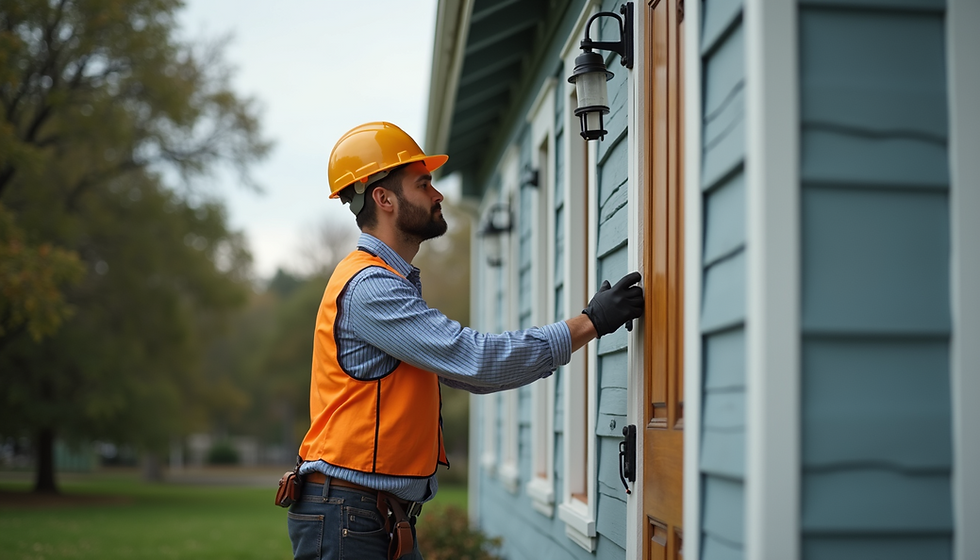The Unseen Value of Pre-Drywall Inspections in Safeguarding Your Build
- David Lee
- Jul 9, 2025
- 4 min read
Starting a new construction project is often a thrilling experience. You envision beautiful interiors, modern design features, and quality materials. Yet, there's a crucial step often overshadowed by the excitement—the pre-drywall inspection. This procedure plays an essential role in protecting your investment, ensuring that everything behind the walls meets safety standards and quality guidelines before it's sealed away for good.
Understanding Pre-Drywall Inspections
A pre-drywall inspection takes place right before drywall is installed in new constructions. This step is vital for confirming that critical systems—like plumbing, electrical work, and HVAC—are properly installed and compliant with local codes. These codes are established for safety and durability, making it essential for builders and homeowners to have a qualified inspector examine these systems before they become hidden.
Having an experienced inspector can help catch potential problems early, sparing you from expensive repairs in the future.
The Key Benefits of Pre-Drywall Inspections
1. Identifying Code Violations Early
Pre-drywall inspections shine a light on code violations that can cause headaches down the road. For example, in many areas, more than 30% of new constructions face violations related to electrical and plumbing codes. If these problems are not caught before the drywall goes up, the costs to address them can soar, sometimes reaching thousands of dollars.
By ensuring compliance with local codes upfront, you avoid the hassle of fines or corrective measures later on. Correcting issues before closing the walls is significantly easier than dealing with them afterward.
2. Ensuring System Integrity
With systems exposed during the pre-drywall phase, this is the perfect time to verify their integrity. Whether it’s making sure plumbing pipes are properly aligned or confirming electrical wiring meets safety measures, this step is critical.
For instance, if plumbing is installed incorrectly, leaks may not show up until extensive damage has occurred. According to industry reports, fixing a hidden leak after drywall is installed can cost homeowners an average of $3,000. Conducting a thorough inspection now can protect you from such unexpected expenses.
3. Protecting Your Investment
Constructing a new building is a significant financial commitment. A pre-drywall inspection serves as an insurance policy for that investment. According to a 2021 survey, about 25% of construction projects exceed their budgets due to unforeseen repairs. Identifying and addressing issues before the drywall goes up can save you from these budget-breaking surprises.
By taking this precaution, homeowners can feel secure knowing they’re protecting their financial investment and the longevity of their property.

4. Peace of Mind
Building a new home can be an emotional rollercoaster filled with both excitement and anxiety. A solid inspection process helps ease that worry. With an expert evaluating the critical components of your project, you won't be caught off guard by issues that could have been prevented.
Knowing that you have taken the necessary steps to avoid problems brings a significant sense of peace to both homeowners and builders.
5. Facilitating Communication
Pre-drywall inspections foster better communication among builders, contractors, and homeowners. When inspectors identify concerns, everyone involved can work together to find solutions. This teamwork can lead to improved relationships and a smoother construction process.
Encouraging early dialogue builds a culture of accountability, reducing the likelihood of misunderstandings and conflicts later in the project.
What to Expect During a Pre-Drywall Inspection
1. Scheduling the Inspection
Understanding where you are in your construction timeline is key before scheduling your inspection. Ideally, pre-drywall inspections happen after HVAC, plumbing, and electrical systems have been installed but before drywall installation begins. Early planning and communication are essential for ensuring a smooth process.
2. Performing the Walkthrough
During the inspection, the inspector will conduct a thorough walkthrough of the construction site. They will evaluate:
Structural integrity
Proper insulation
Installation of mechanical systems
This helps to ensure that everything aligns with building codes and standards.
3. Documenting Findings
After the walkthrough, the inspector will provide a detailed report outlining their findings, recommendations, and any necessary corrective actions. This document serves as a valuable tool for builders and homeowners to confirm compliance and address any required fixes before proceeding with drywall installation.
Homeowners can use the report for follow-up discussions and as a reference for recommendations made by the inspector.
The Importance of Pre-Drywall Inspections in Construction
In the complex process of building a new property, pre-drywall inspections prove invaluable. This step not only safeguards your investment by confirming that all systems are safely and soundly installed but also encourages effective communication throughout the construction journey.
Although it may seem like a small upfront investment in time and resources, the potential for avoiding expensive repairs and the peace of mind it provides make it a wise choice. Making pre-drywall inspections a priority ensures adherence to safety standards, resulting in a structure that is not only beautiful but built to endure.
A little extra diligence today leads to significant rewards tomorrow—so consider pre-drywall inspections an essential part of your building strategy.









Comments